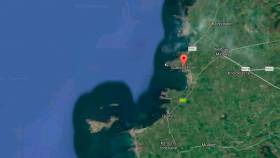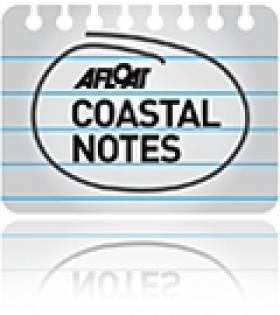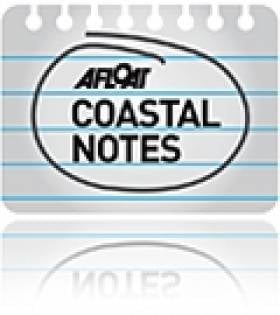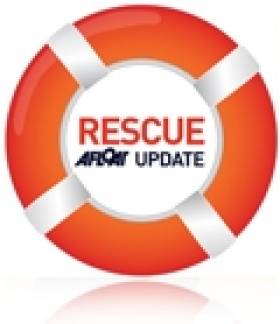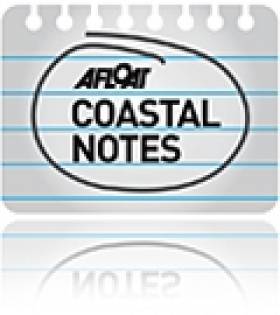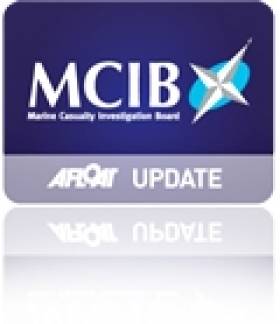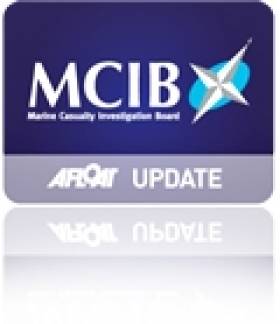Displaying items by tag: Spanish Point
Swimmer Rescued After Getting into Difficulty Off Spanish Point
Breaking News reports that a woman has been rescued after getting into difficulty while swimming at Spanish Point on the Co Clare coast this morning (Sunday 28 November).
It’s understood that the woman, in her 60s, found herself out of her depth in the water off Black Rock. She was reportedly recovered ashore by a passer-by who entered the water.
A multi-agency rescue operation was subsequently stood down but coastguard volunteers from Kilkee and other crews attended the scene, where the woman was treated at the scene. Breaking News has more HERE.
A training exercise testing the response capabilities of Shannon Foynes Port Company, local authorities and other organisations who operate in the vicinity of the Shannon Estuary will take place at Spanish Point, County Clare, on Wednesday and Thursday of next week (26-27 April).
The simulated event, which is being hosted by Clare County Council on behalf of the Shannon Estuary Anti-Pollution Team (SEA-PT), will centre on a major spillage of crude oil having occurred from an oil exploration platform located approximately 220km off the south west coast of Ireland and oil coming ashore at Spanish Point.
Other parameters for the exercise will include notification that the source of the pollution has been brought under control and that there have been no casualties on the oil exploration platform.
There will be a practical element on site at Spanish Point involving operation and demonstration of equipment while a technical briefing will be carried out on equipment on site for officials. The second day of the event will consist of the management of a simulated large scale event for senior management of Local Authorities, SEA-PT members and the Coastguard in Clare County Council’s headquarters at Áras Contae an Chláir, Ennis, which will act as the Incident Command Centre.
“Spill simulations are an excellent way to exercise and train personnel in their emergency roles and to test contingency plans and procedures,” explained John Leahy, Senior Engineer, Clare County Council.
“Valuable lessons can be learned from such exercises, which include a variety of participants, such as oil spill management teams, field responders and regulators and community members. Participants will work together in conducting a simulated response to this hypothetical incident in order to demonstrate proficiency and validity of the oil pollution response plan which is in place for Clare,” he said.
Clare County Council has advised that the training event will not be open to the public while the northern end of the public carpark will be closed off to the public on 25th and 26th April. Public access to Spanish Point beach will be maintained throughout the exercise.
Providence Divesting Almost One-Third Of Spanish Point Interest
#Oil&Gas - Providence Resources is divesting almost a third of its interest in its Spanish Point prospect, as The Irish Times reports.
The Irish oil and gas exploration company intends to sell off a 32% "non-operated interest" in the area off the coast of Co Clare, in the northern part of the Porcupine Basin, which has been shown to hold enormous reserves of oil.
Providence delayed its own exploration at Spanish Point earlier this year due to "unforeseen changes" to its joint venture at the well.
But drilling is now expected to take place in 2017 pending State approval.
The Irish Times has more on the story HERE.
Spanish Point Drilling Delayed By Oil & Gas Exploration Firm
#Oil&Gas - Providence Resources has delayed exploration of its Spanish Point well off Co Clare "pending discussions with partners and the Government", as The Irish Times reports.
Already pushed back from last summer due to the longer-than-planned refurbishment of the Blackford Dolphin rig, the Spanish Point option - granted in January last year – was subsequently seismic surveyed for oil and gas condensate in the autumn.
The latest delay, however, comes after "recent unforeseen changes to the make-up of the joint venture".
That's according to Providence chief executive Tony O'Reilly, who adds that discussions with interested third parties for the prospect continue.
The Irish Times has more on the story HERE.
Providence Delays Spanish Point Appraisal Till 2015
#Oil - Delays in the refurbishing of the Blackford Dolphin oil rig have prompted Providence Resources to push back their appraisal drilling on Spanish Point till 2015, as Business & Leadership reports.
The Irish oil and gas firm was granted a new licensing option for the well some 160km off Spanish Point in Co Clare earlier this year, helping to put the company "in the leading position" in a zone that's rich in undersea hydrocarbons.
However, the Blackford Dolphin, which was scheduled to drill the well this summer, only recently left Belfast after a six-month refurbishment that was originally planned for just six weeks.
And the giant oil rig will no longer be headed for the Clare coast as planned, following the termination of Providence's contract with Dolphin.
With the delays meaning that drilling could not commence till October this year, Providence has chosen to postpone the project till next spring - and will also tender for another rig for the job.
Business & Leadership has more on the story HERE.
Lifeguards Come To Seán Bán's Rescue in Coastal Drama
#Rescue - RTÉ's veteran voice of the Gaeltacht was rescued by beach lifeguards while swimming at Spanish Point in Co Clare earlier this week.
The Irish Independent reports that Seán Bán Breathnach was believed to be caught in a rip current while swimming at the popular seaside haunt on a break from broadcasting for Radio Na Gaeltachta in the area.
Speaking after, Breathnach put down the incident as "nothing really", saying he "wasn't out of my depth, I was just bobbing up and down".
Despite this, rip currents such as that he was caught in are never to be taken lightly - as last week's rescue of a family of six at Castlerock beach in Co Derry proves all too true.
And with the death toll from drownings around Ireland during this week's heatwave reaching five as of yesterday, the risks associated with the water are very real.
Semisub Rig To Drill in Porcupine Basin
#Oil - The Blackford Dolphin semisubmersible drilling rig is expected to go to work off the south-west coast of Ireland next spring.
Offshore reports that Dolphin Drilling has negotiated the contract to appraise the Spanish Point prospect in the Porcupine Basin on behalf of Capricorn Ireland, subject to regulatory approval.
It will also drill early next year in British waters for MPX North Sea, with both contracts expected to last five months for a total revenue of €67 million.
The Porcupine Basin off Kerry has been identified as a source of enormous reserves of oil - after Petrel Resources announced the discovery of as much as one billion barrels of oil at the prospect late last year.
Loss of Buoyancy Led to Drowning of Lady Eileen Crew - MCIB
#MCIB - Overloading of the boat deck and a missing hatch at the stern may have caused a fatal loss of buoyancy that led to the drowning of two fishermen off Co Clare last year, according to the official report into the incident.
As previously reported on Afloat.ie, the remains of the two fishermen were found by local divers at the wheelhouse of their sunken boat near Spanish Point on 14 August 2012 during a search operation for the fishing vessel Lady Eileen.
Their craft had been reported missing the previous day after they failed to return from a trip to mend snagged nets, and a massive search operation was mounted after debris and diesel were discovered in the water close to Spanish Point that evening.
The two men lost were later named as owner/skipper Michael Galvin and crew Noel Dickinson, both of Quilty in Co Clare.
In its official report into the incident, the Marine Casualty Investigation Board (MCIB) found that the vessel had a low freeboard, such that even in an unladen condition it would not have to heel by a significant degree to take water on the deck.
With the weight of nets and the seawater tank used to store crustaceans, the vessel's freeboard was reduced such that water would be allowed to "flow freely on to the deck even in very calm weather conditions". This is water that would not be quickly released, with potentially very serious effects on the craft's buoyancy.
In addition, a panel removed by Galvin some weeks before to do repair work on the sterngear appeared not to have been replaced, possibly allowing a catastrophic amount of water on deck if the boat encountered wind or wave action.
With no witnesses to the incident it is unknown exactly what happened to cause the boat to be swamped, though it is thought to have transpired very quickly as neither man was wearing a lifejacket and the boat's manually operated emergency beacon in the wheelhouse was not activated.
Among the MCIB's recommendations is that the Minister for Transport reviews the Code of Practice for fishing vessels under 15m to devise new stability criteria.
Volunteers participating in search operations have also been urged to co-ordinate their assistance, after an open boat with three on board was capsized by waves while searching for the Lady Eileen and its crew.
All were thrown overboard though were quickly rescued by Garda divers in the area.
The full report from the MCIB is available to download below.
Four Deaths At Sea Set To Be Investigated
#MCIB - The bodies of two fishermen missing off Co Clare have been recovered, as The Irish Times reports.
Local divers found the remains shortly before lunchtime yesterday near Spanish Point as coastguard teams searched for a missing fishing boat.
As previously reported on Afloat.ie, the Lady Eileen - with two crew on board - was due to return to Quilty on Monday evening.
Searchers discovered debris and diesel in the water near Spanish Point in the early stages of the search on Monday night.
Meanwhile, the body of a father-of-three from Clare Island in Co Mayo was recovered from the sea by local fishermen last night.
The man - whose name is being withheld till all relations have been informed - was reported missing by a relative after he failed to return from a fishing trip in his currach.
The Marine Casualty Investigation Board (MCIB) is expected to open investigations into both incidents, as well as the death of John O'Leary of Allihies in West Cork, who lost his life after the Enterprise dinghy he was sailing with his son capsized off the Beara Peninsula on Monday.
#NEWS UPDATE - BreakingNews.ie reports that a man from Ennis has died after getting into difficulty while swimming off the Co Clare coast yesterday evening.
According to RTÉ News, the 51-year-old man was swimming at Whitestrand off Spanish Point around 5.30pm when he was spotted in distress and retrieved from the water by a lifeguard.
The man was given CPR until paramedics arrived and he was subsequently airlifted to Galway University Hospital by Irish Coast Guard helicopter.
He was later pronounced deceased, with the cause of death yet to be determined.


























